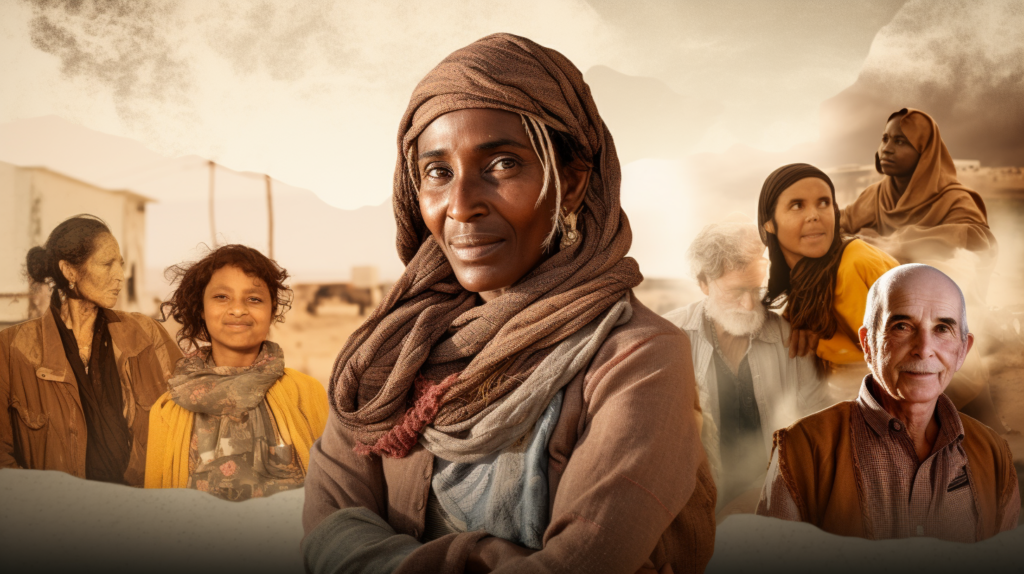Are you looking for a way to create unforgettable experiences and make a difference in the world? Cultural exchange and volunteering might be the perfect opportunity for you! In this article, we will explore the exciting world of cultural exchange and volunteering, and how it can enrich your life in countless ways.
As the world becomes increasingly interconnected, the importance of understanding and appreciating different cultures has never been greater. Cultural exchange allows individuals to immerse themselves in a foreign culture, learn from its people, and share their own experiences. Volunteering takes this a step further by providing an opportunity to give back to communities in need.
Both cultural exchange and volunteering offer unique experiences that can broaden your perspective, build empathy, and foster personal growth. Additionally, these experiences provide an opportunity to develop new skills and make lifelong connections with people from all around the world.
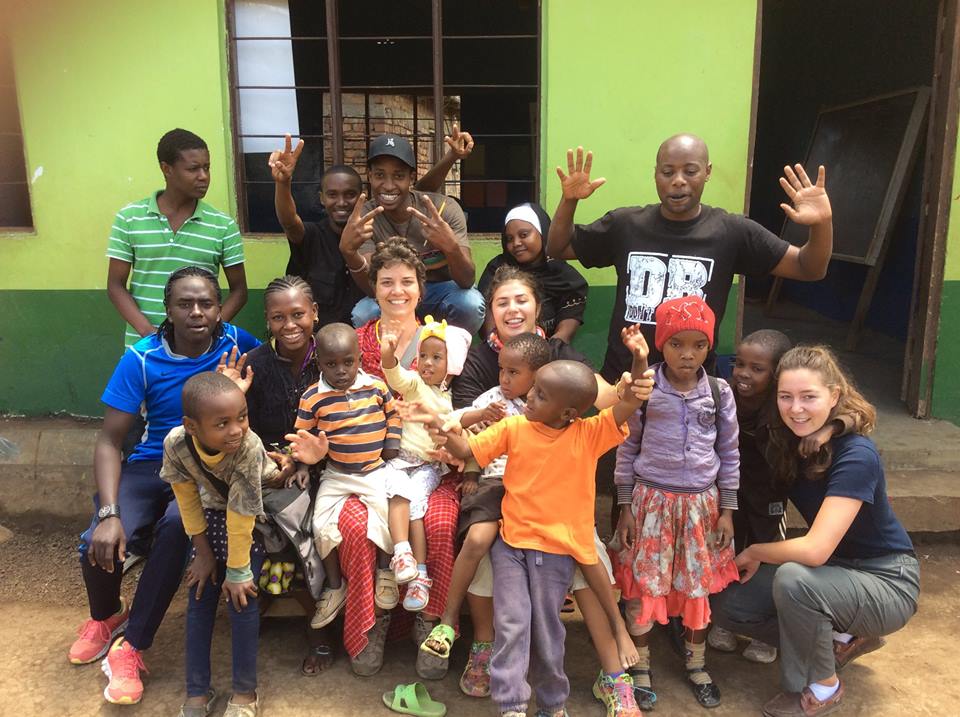
If you’re ready to embark on a journey of self-discovery, adventure, and making a positive impact, keep reading to learn more about cultural exchange and volunteering opportunities.
Understanding Cultural Exchange
Cultural exchange is a powerful way to connect with people from different backgrounds and learn about their customs, traditions, and way of life. It involves immersing yourself in a different culture, often through travel or volunteering, and actively engaging with the local community. This exchange of ideas, knowledge, and experiences can be a life-changing experience for both parties involved.
Definition and Importance
Cultural exchange refers to the mutual sharing of cultural practices, values, and beliefs between individuals or groups from different cultural backgrounds. It can take place at various levels, such as between countries, communities, or even between individuals on a personal level.
The importance of cultural exchange cannot be overstated. It helps foster a sense of understanding, respect, and appreciation for different cultures. It breaks down stereotypes and promotes intercultural dialogue, leading to a more inclusive and tolerant society. Cultural exchange also allows us to learn from each other, broaden our perspectives, and gain new insights into the world we live in.
Benefits of Cultural Exchange
Participating in a cultural exchange program can bring numerous benefits, both personal and societal. Here are a few advantages of engaging in cultural exchange:
- Cross-cultural Understanding: Through cultural exchange, you get to experience different ways of life firsthand, which helps deepen your understanding of diverse cultures and promotes global awareness.
- Language Acquisition: Immersing yourself in a new culture can be a fantastic opportunity to improve your language skills by conversing with locals and practicing in real-life situations.
- Networking and Building Relationships: Cultural exchange allows you to create meaningful connections with people from all corners of the globe, expanding your network and forming lifelong friendships.
- Personal Growth: Stepping out of your comfort zone and immersing yourself in a different culture can lead to personal growth and self-discovery. It helps you develop resilience, adaptability, and an open-mindedness towards new experiences.
In summary, cultural exchange is a valuable and transformative experience that fosters mutual understanding, promotes personal growth, and contributes to building a more interconnected world. It is an opportunity to embrace diversity, challenge your own perspectives, and learn from one another. So, why not embark on a cultural exchange journey and create memories that will last a lifetime?
Different Forms of Cultural Exchange
Cultural exchange can take many forms, providing individuals with diverse opportunities to immerse themselves in different cultures and gain valuable insights. Here are some popular forms of cultural exchange:
1. Study Abroad Programs
Studying abroad is a fantastic way to experience a new culture while pursuing your academic goals. Many universities offer study abroad programs where students can spend a semester or even a year studying in a foreign country. This allows students to interact with local students, learn from local professors, and explore their host country’s unique traditions and customs.
2. Language Exchange Programs
Language exchange programs provide a platform for individuals to learn a new language while sharing their native language with others. Participants typically meet regularly with a language partner, engaging in conversation and practicing speaking skills. This form of cultural exchange not only improves language proficiency but also fosters cultural understanding by learning about another culture through its language.
3. Homestays and Hostels
Staying with a host family or in a hostel is an immersive way to experience a different culture firsthand. In a homestay, individuals live with a local family, sharing meals, participating in family activities, and observing daily routines. This allows for a deeper understanding of local customs, traditions, and ways of life. Hostels, on the other hand, provide a vibrant social environment where travelers from different countries come together. It offers opportunities to interact with people from various cultures and forge new friendships.
Cultural exchange can take various forms, and it’s important to choose the one that aligns with your interests and preferences. Whether you decide to study abroad, participate in a language exchange program, or opt for a homestay or hostel experience, each option offers its own unique benefits and enriching experiences. Take the time to research and find the cultural exchange opportunity that resonates with you the most.
Did you know?
Cultural exchange programs are not limited to young people. Many organizations offer opportunities for adults to engage in cultural exchange through programs such as language courses, volunteer work, and professional exchanges. Age is no barrier when it comes to learning and experiencing new cultures!
So, which form of cultural exchange appeals to you the most? Do you want to enhance your academic experience through a study abroad program, improve your language skills through a language exchange, or immerse yourself in a new culture through a homestay or hostel? The choice is yours, and the possibilities for growth and learning are endless!
Choosing a Volunteering Opportunity
When it comes to choosing a volunteering opportunity for cultural exchange, there are a few important factors to consider. Here’s a helpful guide to help you navigate the process and find the right opportunity for you:
Identifying Your Interests and Passions
Before diving into the world of volunteering, take some time to reflect on your interests and passions. What causes or issues are you passionate about? Do you have any specific skills or expertise that you would like to contribute? Identifying these factors will help you narrow down your options and find a volunteering opportunity that aligns with your personal interests and strengths.
Researching Reputable Organizations
Once you have a clear idea of what you’re looking for, it’s important to research reputable organizations that offer volunteering opportunities. Look for organizations that have a proven track record and positive reviews from previous volunteers. Websites like VolunteerMatch and Idealist can be great resources for finding volunteer opportunities and vetting organizations.
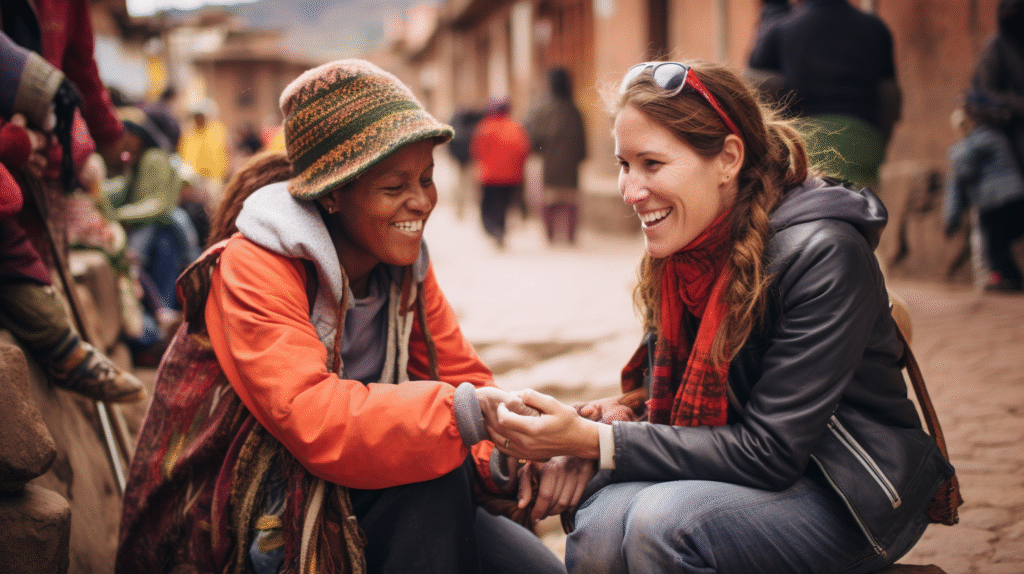
Considerations for Safety and Impact
When choosing a volunteering opportunity, it’s crucial to consider safety and the impact of your work. Here are a few things to keep in mind:
- Safety: Make sure the organization you choose has proper safety measures in place and takes the well-being of volunteers seriously.
- Long-term Impact: Look for volunteering opportunities that have a long-term impact on the community. Sustainability is key, so consider projects that focus on education, empowerment, and capacity-building.
- Local Engagement: Select organizations that prioritize involving and empowering the local community in their projects. This ensures that the work being done is respectful, culturally sensitive, and truly beneficial.
Taking these factors into account will help you find a volunteering opportunity that not only aligns with your interests but also makes a positive and sustainable impact.
So, don’t rush into any volunteering opportunity without doing your due diligence. Take the time to research, ask questions, and choose an organization that is reputable and aligned with your values and goals.
“Volunteering is the ultimate exercise in democracy. You vote in elections once a year, but when you volunteer, you vote every day about the kind of community you want to live in.” – Marjorie Moore
Preparing for Cultural Exchange and Volunteering
Preparing for a cultural exchange program or volunteering abroad can be an exciting and transformative experience. It allows you to immerse yourself in a different culture, learn new skills, and make a positive impact on local communities. However, before embarking on this journey, it’s essential to be well-prepared and informed. Here are some important steps to take when preparing for a cultural exchange and volunteering opportunity:
Learning the Local Language and Customs
One of the best ways to enhance your cultural exchange experience is by learning the local language. Knowing even a few basic phrases can help you connect with locals on a deeper level, show respect for their culture, and make your day-to-day activities much easier. Consider taking language classes or using language learning apps to familiarize yourself with the language spoken in the country you’ll be visiting.
In addition to learning the language, it’s crucial to understand and respect the local customs and traditions. Every culture has its own set of social norms and etiquette, and being aware of these will help you navigate daily interactions more smoothly. Research the dos and don’ts of the culture you’ll be immersing yourself in and make an effort to embrace and adopt them.
Arranging Travel and Accommodation
When planning your cultural exchange or volunteering trip, it’s important to make arrangements for your travel and accommodation well in advance. Here are some considerations to keep in mind:
- Research different modes of transportation and choose the one that suits your budget and preferences.
- Look for accommodation options that align with your needs, whether it’s a homestay, hostel, or volunteer house. Read reviews and compare prices to make an informed decision.
- Ensure that you have all the necessary travel documents, such as passport and visas. Check visa requirements for the country you’re visiting and apply in advance if necessary.
Understanding Cultural Sensitivities
Cultural sensitivity is vital when engaging with a new culture. It involves respecting and valuing differences, being mindful of cultural norms, and avoiding behaviors that may be considered offensive. Here are some tips to help you navigate cultural sensitivities:
- Educate yourself on the local customs, traditions, and taboos in the country you’ll be visiting.
- Be open-minded and willing to adapt to new cultural experiences.
- Show respect for local beliefs and practices, even if they differ from your own.
- Listen actively and observe how locals behave in different situations to understand the acceptable norms of behavior.
By taking the time to prepare and educate yourself about the local language, customs, and cultural sensitivities, you’ll be better equipped to immerse yourself fully in the cultural exchange or volunteering experience. These preparations not only show respect for the local community but also enhance your overall experience and ensure a more meaningful and impactful trip.
Benefits of Cultural Exchange and Volunteering
Broadening Global Perspective
By immersing yourself in a different culture, you gain a broader understanding of the world and its diverse ways of life. Experiencing firsthand how people from different backgrounds live, work, and interact can challenge your preconceived notions and expand your horizons. It opens your mind to different perspectives, beliefs, and values, fostering a more inclusive and global mindset.
Building Empathy and Cultural Understanding
Cultural exchange and volunteering allow you to connect with people from different walks of life and develop a deeper sense of empathy and compassion. Through meaningful interactions, you can gain insights into the challenges and triumphs of others and develop a greater appreciation for their cultures and traditions. Building these connections and understanding is vital in fostering cross-cultural harmony and reducing stereotypes and prejudices.
Personal Growth and Skill Development
Engaging in cultural exchange and volunteering provides a unique opportunity for personal growth and skill development. By stepping outside your comfort zone, you learn to adapt to new environments, overcome challenges, and develop valuable life skills such as communication, problem-solving, and teamwork. These experiences also help improve your resilience, confidence, and self-awareness, making you a more well-rounded individual.
“Volunteering is a chance to make a real difference in the lives of others while also transforming your own.” – Unknown
“Cultural exchange is not merely exchanging souvenirs; it’s about exchanging knowledge, experiences, and understanding.” – Unknown
“Volunteering provides an opportunity to contribute to a cause that resonates with your core values and passions.” – Unknown
“Cultural exchange helps us recognize our shared humanity and appreciate the beauty of our diverse world.” – Unknown
In a world that often emphasizes individualism, cultural exchange and volunteering remind us of the importance of community engagement and the power we have to make a positive impact. These experiences provide a sense of fulfillment and purpose, knowing that you are contributing to something greater than yourself.
So whether it’s participating in a language exchange program, teaching in a local school, or supporting sustainable projects abroad, embracing cultural exchange and volunteering can be a life-changing experience. It not only benefits the communities you engage with but also transforms you into a more empathetic, open-minded, and globally conscious citizen. So why not embark on this remarkable journey and make a difference in the world while also discovering the limitless possibilities within yourself?
Challenges and Overcoming Obstacles
Embarking on a cultural exchange and volunteering experience can be incredibly rewarding, but it’s important to acknowledge that there may also be some challenges along the way. Here are a few common obstacles that volunteers may face and some strategies for overcoming them:
Language Barriers and Communication
One of the most common challenges when participating in a cultural exchange is the language barrier. Communicating effectively with locals can become difficult, especially if you’re in a country where you don’t speak the native language. Here are a few tips to help you navigate this challenge:
- Take Language Classes: Consider taking language classes before your trip or while you’re there. Learning a few key phrases can go a long way in breaking down barriers and building connections.
- Use Translation Apps: Utilize translation apps on your smartphone to help bridge the communication gap. Apps like Google Translate can be incredibly useful for quick translations on the go.
- Non-Verbal Communication: Remember that communication isn’t just about words. Non-verbal communication, such as gestures and body language, can also be effective in conveying messages.
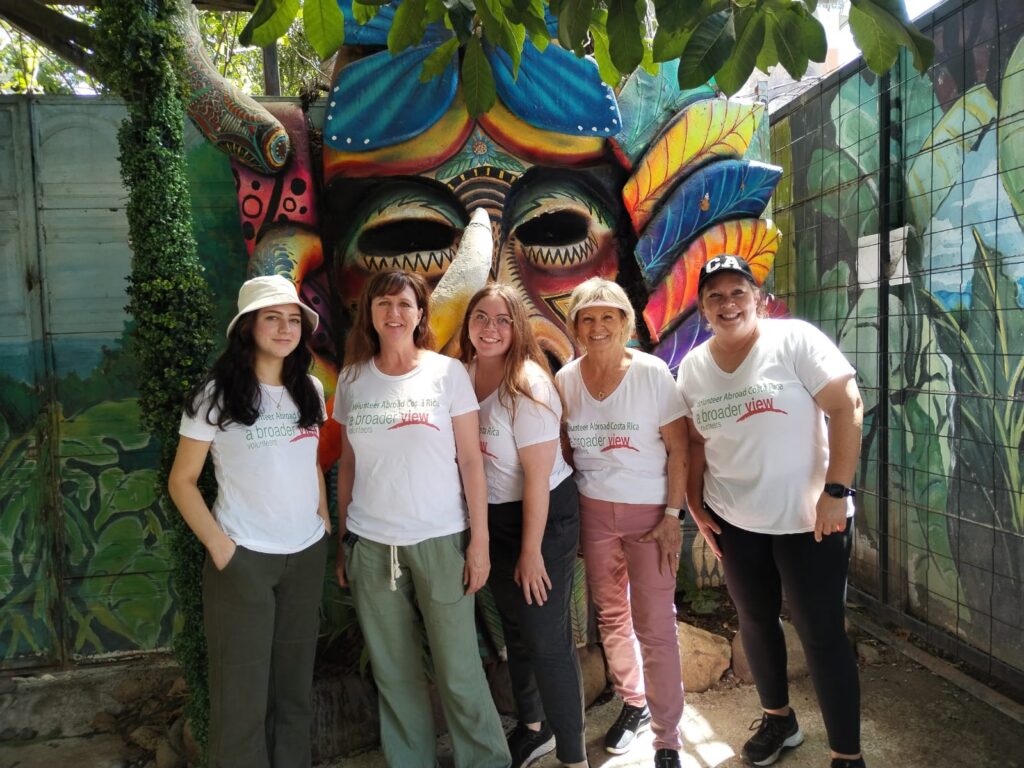
Cultural Adjustment
Adjusting to a new culture can be overwhelming, especially if it’s vastly different from your own. Here are some strategies to help you navigate the process of cultural adjustment:
- Be Open-Minded: Embrace the differences and be open to new experiences and perspectives. Remember that cultural exchange is about learning and understanding different ways of life.
- Observe and Learn: Take the time to observe and learn about the local customs, traditions, and social norms. This will help you better adapt to the culture and avoid unintentionally offending anyone.
- Ask for Help: Don’t hesitate to ask for help or guidance from locals or fellow volunteers. They can provide valuable insights and support as you navigate the new culture.
Dealing with Homesickness
Being away from home for an extended period can sometimes lead to feelings of homesickness. Here are a few strategies to help you cope with homesickness:
- Stay Connected: Schedule regular video calls or phone calls with loved ones back home. Receiving support from friends and family can help alleviate homesickness.
- Create a Support Network: Build strong relationships with fellow volunteers or locals who can provide emotional support. Sharing your experiences and feelings can help you feel less alone.
- Focus on the Present: Engage fully in your volunteering activities and immerse yourself in the local culture. Keeping busy and being present can help distract from feelings of homesickness.
Remember, challenges are a natural part of any new experience, but with the right mindset and strategies, you can overcome these obstacles and have a truly transformative cultural exchange and volunteering experience.
“Challenges are what make life interesting. Overcoming them is what makes life meaningful.” – Joshua J. Marine
Stories and Experiences from Volunteers
Volunteering offers a unique opportunity to immerse yourself in a different culture and make a positive impact on the local community. Many volunteers come away from their experiences with unforgettable stories and life-changing moments. Here, we’ll explore some inspiring stories and experiences shared by volunteers from around the world.
Sharing First-hand Experiences
Volunteers often find themselves in situations they never could have anticipated and end up with incredible stories to tell. Whether it’s teaching English in a remote village or assisting in wildlife conservation efforts, every volunteer has a tale to share. Here are some examples:
- Emily’s Teaching Adventure: Emily, a volunteer in Thailand, spent several months teaching English in a local school. She was initially nervous about the language barrier, but with time, she bonded with her students and developed a deep connection. Emily’s most memorable moment was when her students surprised her with a heartfelt thank-you ceremony on her last day.
- Javier’s Wildlife Encounter: Javier volunteered at a sea turtle conservation project in Costa Rica. One night, he witnessed a baby sea turtle hatching and making its way to the ocean. It was a magical experience for Javier, who felt a sense of fulfillment knowing that his efforts were contributing to the preservation of these beautiful creatures.
Impactful Moments
Volunteering allows individuals to make a tangible difference in the lives of others. These impactful moments are often transformative for both the volunteer and the community they serve. Here are a few examples:
- Maria’s Medical Mission: Maria, a medical volunteer in Africa, encountered a young child suffering from a life-threatening illness. With the support of the local medical team, Maria was able to arrange for the child to receive the necessary treatment. Witnessing the child’s recovery and the gratitude of the family left a lasting impact on Maria, confirming her passion for global health.
- Sam’s Construction Project: Sam joined a construction project in a rural community in Nepal, helping to build homes for families in need. Throughout the project, he formed close bonds with the local community, who showed immense gratitude for his efforts. Seeing the smiles on the faces of the families as they moved into their new homes made all the hard work worthwhile for Sam.
Life Lessons
Volunteering is not only about the impact you make on others but also about the personal growth and valuable life lessons you gain along the way. Here are a couple of examples:
- Lina’s Cultural Exchange: Lina volunteered at an orphanage in India, where she quickly realized the power of empathy and understanding. By embracing the local customs, traditions, and way of life, Lina formed deep connections with the children. Through this experience, she learned to appreciate the beauty of diversity and the importance of cultural exchange.
- Mark’s Resilience and Adaptability: Mark volunteered in a remote village in Peru, where the living conditions were challenging. Limited access to basic amenities like electricity and running water tested Mark’s resilience and adaptability. Through this experience, he developed a newfound appreciation for the simple luxuries that we often take for granted.
These stories and experiences from volunteers highlight the profound impact that cultural exchange and volunteering can have on individuals and communities. Each experience is unique and offers valuable lessons, personal growth, and a chance to make a positive difference in the world.
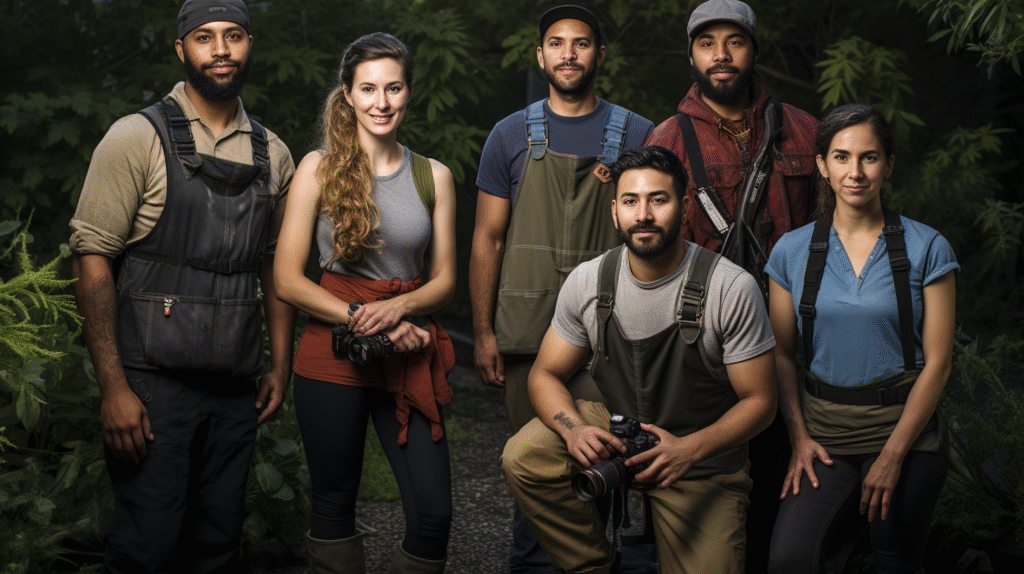
Giving Back to the Local Community
One of the most rewarding aspects of cultural exchange and volunteering is the opportunity to give back to the local community. Engaging in meaningful service projects can make a positive impact on the lives of the people and the places you visit. Whether it’s supporting sustainable projects, teaching and skill sharing, or preserving cultural heritage, there are countless ways to contribute and make a difference.
Supporting Sustainable Projects
Supporting sustainable projects is a great way to give back to the local community while promoting long-term environmental and social well-being. This can involve activities such as:
- Participating in environmental conservation initiatives, such as reforestation or beach clean-ups.
- Assisting with community development projects, including building infrastructure or improving access to clean water.
- Supporting local businesses and artisans, helping to promote economic growth and sustainability.
By getting involved in sustainable projects, you not only contribute to the community’s welfare but also gain valuable insights into the local environment and culture. It’s a win-win situation!
Teaching and Skill Sharing
Sharing your knowledge and skills can have a lasting impact on the lives of others. Many volunteer opportunities involve teaching English, math, or computer skills to children and adults in the local community. This not only helps improve their educational opportunities but also empowers them to pursue better career prospects.
Additionally, you can share your expertise in areas such as sports, art, music, or any other skill you possess. By teaching and engaging with the locals, you create a positive ripple effect that goes beyond your time there. Education is a powerful tool for transformation, and by giving back in this way, you can help bridge the gap and promote a brighter future for the community you’re serving.
Preservation of Cultural Heritage
Preservation of cultural heritage is another important way to give back to the local community during your cultural exchange and volunteering experience. Many communities around the world are rich in traditions, customs, and art forms that are at risk of being lost over time. By getting involved in cultural preservation efforts, you can help ensure the survival and promotion of these valuable cultural aspects. Some ways to contribute include:
- Assisting with the restoration and maintenance of historical sites or landmarks.
- Documenting and archiving local stories, traditions, and music.
- Participating in cultural events and festivals, helping to keep traditions alive.
Preserving cultural heritage not only benefits the local community but also promotes cultural diversity and understanding globally. It’s a meaningful way to bridge the gap between different cultures and foster mutual respect and appreciation.
In conclusion, giving back to the local community is a vital aspect of cultural exchange and volunteering. By supporting sustainable projects, teaching and skill sharing, and preserving cultural heritage, you can make a positive impact on the lives of others and create lasting memories and learnings for yourself. Remember, it’s not just about the time you spend there; it’s about the impact you leave behind. So, get involved, give back, and make a difference!
Conclusion
In conclusion, participating in cultural exchange and volunteering opportunities offers incredible experiences and countless benefits. It allows individuals to immerse themselves in different cultures, broaden their global perspective, and develop empathy and understanding for others.
Volunteering also provides a unique chance to give back to local communities, support sustainable projects, teach and share skills, and preserve cultural heritage. It is a way to make a positive impact and contribute to the greater good.
While cultural exchange and volunteering may come with challenges such as language barriers and cultural adjustment, these obstacles can be overcome with patience, open-mindedness, and a willingness to learn and adapt.
The stories and experiences shared by volunteers illustrate the transformative power of cultural exchange and volunteering. They highlight impactful moments, life lessons, and personal growth that can be gained through these experiences.
So, whether you choose to participate in a study abroad program, engage in a language exchange, or stay with a host family, cultural exchange and volunteering offer unforgettable experiences and invaluable learnings. They allow you to step outside your comfort zone, connect with people from diverse backgrounds, and create lasting memories.
So, why wait? Start exploring the world and making a difference through cultural exchange and volunteering. As you embark on this journey, remember to stay open-minded, respectful, and ready to embrace the beauty of different cultures. Happy volunteering!

Frequently Asked Questions
- What is cultural exchange?Cultural exchange refers to the process of sharing and learning about different cultures, traditions, values, and perspectives through interactions with individuals from different cultural backgrounds.
- How can volunteering facilitate cultural exchange?Volunteering allows individuals to immerse themselves in different communities and cultures, providing opportunities to interact with locals, learn about their way of life, customs, and traditions. Through volunteering, individuals can gain a deeper understanding and appreciation for diverse cultures.
- What are the benefits of engaging in cultural exchange?Engaging in cultural exchange broadens one’s horizons, promotes tolerance, empathy, and appreciation for diversity. It allows individuals to gain a new perspective, challenge stereotypes, and develop cross-cultural communication skills.
- Are there any risks involved in cultural exchange and volunteering?While cultural exchange and volunteering can be incredibly rewarding experiences, there may be some risks involved. These may include language barriers, cultural misunderstandings, homesickness, and potential health and safety concerns. It is important to carefully research and prepare for the specific destination before embarking on such experiences.
- How can I find opportunities for cultural exchange and volunteering?There are several organizations and platforms that connect individuals with volunteering opportunities abroad. Research reputable organizations, read reviews, and consider factors such as the duration of the program, cost, cultural immersion opportunities, and support provided. Additionally, consider local volunteering opportunities in your own community to engage in cultural exchange.

